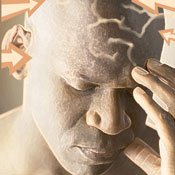Wednesday, June 17, 2009
As I walked down St. Charles Street in New Orleans after a Mardi Gras parade, I heard a loud horn honking behind me. I turned and threw an irritated look at the car rolling toward the crowds at a few miles per hour.
"Really? " I thought. "Did you think it was a good idea to drive here during Mardi Gras? "
When I saw the driver 's face, however, my annoyance melted away. The woman was alone in her car, and her face was contorted with frustration as she tried to advance past the hordes of people. She rolled down her window to exchange heated words with a few parade-goers, who seemed to be harassing her as she tried to pass. She then rolled up her window, put her cell phone to her ear perhaps to call the friends she was trying to meet and began to cry.
Robert Sapolsky, a biology and neurology professor at Stanford, would classify this event as particularly stressful for the driver because all of the following criteria applied:
* An unpredictable outcome. She didn 't know how or when she 'd get out of the jam.
* Perception of little control. The crowd would move at its own pace, no matter how much she honked.
* Perception that things were getting worse. The crowd thickened as she advanced.
* Minimal outlets for frustration. Sitting in the car, she didn 't have many options for releasing stress.
* Social isolation. Though she had phoned someone, she didn 't have anyone in the car to share the burden.
Why Zebras Don 't Get Ulcers
Sapolsky, author of the book "Why Zebras Don 't Get Ulcers, " explains that the purpose of stress is to protect living beings from danger. When a zebra on the savannah senses a lion nearby, its body responds the same way as a human 's does when stressed: The brain pumps stress hormones, cortisol and adrenaline through the bloodstream, and the body 's organs and muscles prepare for fight or flight.
The body channels all its energy toward immediate survival, shutting down long-term developments, such as cell generation, digestion and energy storage.
Why Humans Do Get Ulcers
When a zebra outruns a predator, its body immediately returns to balance (homeostasis). Humans, on the other hand, may never fully relax from perceived threats, because many are psychological. Thoughts about events can trigger the same stress response as the events themselves. We also tend to feel stressed when obstacles block our desires, like when we get stuck in a slow-moving checkout line, which can happen several times a day.
Regularly raising your stress levels wreaks havoc on your body. When you are stressed, your body focuses on surviving, not thriving long term. Prolonged stress is associated with a whole host of symptoms like a weak immune system, digestive trouble, headaches, insomnia and hair loss. Over time it can lead to chronic fatigue, memory problems, clogged arteries, high blood pressure, and weight gain (especially belly fat). Stress is also related to depression, relationship problems, lower productivity and even heart failure.
Name any ailment you may have, and stress will probably make it worse. Are you feeling stressed just reading this?
If you are, there 's hope. The first step is deciding that while it 's common to think of stress as just a part of life, it doesn 't have to be. Maintaining balance is your body 's job, so make that job easier by maximizing these elements in your life.
If you 're prone to stress, you can learn to relax with practice. Remind yourself that getting stressed about a situation has never improved it. You will be surprised at how much happier you will feel when you let go.
Are You Stressed?
1. Are you often bothered by little hassles?
2. Do you often feel tired?
3. Have you had any significant weight gain or loss?
4. Is your stomach frequently upset?
5. Do you get sick often?
6. Do you have trouble with concentration or memory?
7. Do you tend to feel anxious, depressed or antisocial?
8. Do your eating and drinking habits fluctuate with your mood?
9. Have you noticed abnormal hair loss?
10. Do you have muscle tension or jaw pain?
11. Do you have tightness in your chest or trouble breathing?
12. Do you often have emotional outbursts?
If you answered "yes " to several of these questions, you are showing symptoms of stress.
Ways to Reduce Stress
Now
* Get moving. You 'll trick your body into thinking that it 's acted on its fight or flight response, and you 'll relax.
* Visualize yourself calm. Close your eyes and picture yourself in a setting that relaxes you. Your brain will release the same endorphins (feel-good hormones) that it does when you 're actually there.
* Laugh. Watch funny clips online, or call a friend who never fails to crack you up.
* Breathe. Close your eyes and count 60 slow, deep breaths. You can spare one minute for your health.
* Socialize. Humans need social support. Have lunch with coworkers, or go to a coffee shop for the social contact.
* Shift your mood with catch phrases. Ask yourself, "Will this matter in a year? " or remind yourself, "This is not a cosmic crisis. "
Long-Term
* Volunteer. Volunteers often get a "helper 's high, " feeling happy and energized. Volunteering has been linked to reducing physical pain and illness, and even living longer.
* Take up a sport or exercise routine. Reduce stress by increasing endorphins and taking your mind off your worries. Release built-up tension and increase blood and oxygen flow.
* Get massages. Massages increase blood flow all over the body, which helps put our systems in balance. Think of massage as a health investment, not just a luxury.
